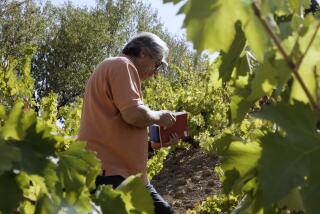They’re making wine out of the fruit too stinky to bring on planes?
- Share via
As if there’s not enough wine in the world, student researchers at National University of Singapore have figured out how to make wine from papaya—and, get this, the notoriously smelly, yet curiously addictive, durian fruit. Durian, you might recall, is the fruit so obnoxiously stinky, in Indonesia, it’s banned from hotel rooms—and planes.
My first response is, what does a wine made from the tropical fruit smell and taste like?
According to a story from channelnewsasia.com, “the research group expects the papaya wine to be well received by tropical wine lovers.”
Christine Lee, a PhD student from the NUS Food Science & Technology Programme, said: “There’s no papaya wine available in the tropical Asian region, so this is the oomph factor. It’s fruity sweet with tropical flora, so once you drink this wine, it will remind you of the tropical region.”
The durian wine could be a harder sell. It seems, according to the story, there have been incidents of people reportedly dying from sudden cardiac problems after consuming durian and alcohol together.
But Dr. Liu Shao Quan of the NUS Food Science & Technology Programme attributes potential fatal incidents to the sulphur compounds in durian. He adds that “actually after fermentation, the sulphur compounds are reduced significantly to the trace levels, so there should not be any safety issues.”
But how does it taste?
It may be awhile before we find out. This is still a pilot study, though the researchers are interested in eventually commercializing their unique tropical wines.
Durian wine? Something that far out is bound to show up in Los Angeles, possibly on the wine list of Night + Market or Lukshon or the latest hipster noodle joint.
I can’t wait.
ALSO:
7 affordable wine picks for the barbecue
Want your red wine to taste better in the heat? Pop it in the fridge
Parmesano gelato? 25 crazy cold flavors for National Ice Cream Month
Twitter: @sirenevirbila
More to Read
Eat your way across L.A.
Get our weekly Tasting Notes newsletter for reviews, news and more.
You may occasionally receive promotional content from the Los Angeles Times.










